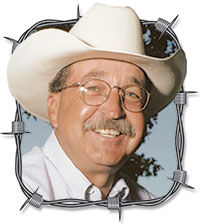Confined to the house and prevented from doing anything meaningful for the past five weeks, I have had the sad opportunity to watch more TV than anyone should ever be forced to view. Because of that, I have come to the conclusion that regardless of how many channels you can receive, there is almost nothing worth watching. I love The Andy Griffith Show, but when I started reciting every line, in unison, with Andy and Barney, I decided I had watched the episodes way too many times.
My youngest son has been coming out every weekend to check my cattle, replenish the mineral feeders and refill the fly mops for me, and he pointed out that I owned a smart TV and I should watch farming and ranching videos on something called a YouTube channel. Completely ignorant of new technology, I had him show me how to access that part of my TV that I didn’t know I had, and watching those videos has made home confinement much more bearable.
I’ve been able to watch videos of cattlemen (and I use the term loosely) in the Azores, raising fighting bulls for the bull rings of western Europe. The corrals are a maze of concrete-walled pens, where the cowboys walk along the tops of the walls, prodding animals with 20-foot long sticks to persuade them to enter ever-smaller pens, until they finally end up in something resembling a squeeze chute. All of the animals, whether bulls, cows or calves, seem to want to kill whatever human is near them. This video reminded me of the kinds of cattle that I raised 25 years ago – when I was a lot more mobile than I am today.
Then there are videos with titles like, “How to end up with $100,000 after only one year in the cattle business!” I, of course, had to click on that video, only to find out that the secret was to start out the year with $1,000,000. Heck, I knew that already.
Most of the videos are either from farms that are so big and heavily mechanized that I can’t relate to, or very small and made by some old hippie who thinks he’s got it all figured out. Only a handful are realistic and practical to someone like me, with the one from Sonne Farms in South Dakota being my favorite. It’s all interesting, but it made me start wondering how these people found the time or money to produce these videos when I came across another video entitled, “How to make money from videoing your daily activities on the farm.”
Evidently, it’s all based on how many views and subscribers you get to watch your show on a daily or weekly basis. Some of the more successful YouTube channels have nearly a half-million subscribers and can earn a couple hundred thousand dollars per year. About a dozen farmers are in that category and certainly find it worth their time to show themselves in various phases of production on their farm. Many of them add to that income by selling clothing and caps with their brand or farm logo plastered all over them – much like a NASCAR driver.
So, folks, be on the lookout sometime during the coming year for the newest YouTube farming video, entitled, “Follow an old farmer around for a year, and watch him screw-up and lose money every day!”
Now, what’s a selfie stick?
Jerry Crownover is a farmer and former professor of Agriculture Education at Missouri State University. He is a native of Baxter County, Arkansas, and an author and professional speaker. To contact Jerry, go to ozarksfn.com and click on ‘Contact Us.’







